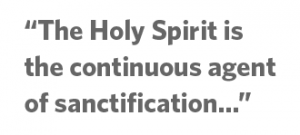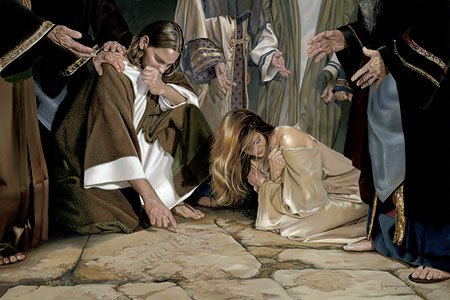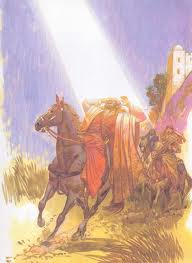Bloor Lansdowne Christian Fellowship – BLCF Church Message for Sunday:
‘Trusting, Serving, and Sharing the Victory in Christ’
© February 17, 2019, by Steve Mickelson
BLCF Bulletin February 17, 2019
Based on a Message Shared at BLCF on May 18, 2014
Announcements and Call to Worship; Prayer
Opening Hymn #553: Morning Has Broken; Choruses
Prayer and Tithing – Hymn #572: Praise God; Prayer Requests
Responsive Reading #605: Prayer of Penitence (– Psalm 51)
Message by Steve Mickelson: ‘Trusting, Serving, and Sharing the Victory in Christ’
Let us pray…
In a Pentecost Sunday Lesson, last year, you may recall that we examined how Mary, the mother of Jesus, was chosen because she had found favor with God and lived an exemplary life, not just as the mother of Jesus, but as a faithful disciple to the Lord as well. We also saw how the disciples hid in the Upper Room, until Jesus, on the evening of the day that he resurrected from the grave, came to give them his Commission and then breathed upon them God’s Holy Spirit to enable them to achieve the goal. Still, one may question, whether Mary and the Apostles could be anything other than the best choice to trust and serve the Lord, as well as to share the gospel of Christ. And by asking this question, we, as every-day sinners, may seek to be excused from serving as the Lord’s apostles or messengers.
Our lesson this Sunday, we revisit for closer examination, a topic touched upon in recent message: how God chose, as His instrument, the Pharisee Saul of Tarsus, an individual, who with the exception of Emperor Nero, was considered the least likely candidate to become a preacher of the Way of Jesus, more commonly known today as the gospel of Christ.
Let us briefly look at our Wiki bits for the background of Saul of Tarsus, who became the Christian Apostle, Paul:
The Conversion of Paul the Apostle, was, according to the New Testament, an event that took place in the life of Paul the Apostle which led him to cease persecuting early Christians and to become a follower of Jesus. It is normally dated by researchers to AD 33–36.[1][2][3] The phrases Pauline conversion, Damascene conversion and Damascus Christophany, and road to Damascus allude to this event. Within the New Testament, Paul’s conversion experience is discussed in both Paul’s own letters and in the book known by the title Acts of the Apostles. According to both sources, Paul was never a follower of Jesus and did not know Jesus before his crucifixion. Instead, he severely persecuted the early Christians. Although Paul refers to himself as an “Apostle” of Jesus, it is clear that Paul was not one of “The Twelve” apostles.[1 Cor. 9:1-2] Paul’s conversion occurred after Jesus’ crucifixion. The accounts of Paul’s conversion experience describe it as miraculous, supernatural, or otherwise revelatory in nature. Before his conversion, Paul, then known as Saul, was a “zealous” Pharisee who “intensely persecuted” the followers of Jesus. Some scholars argue that Paul was a member of the “Zealot” party.
We find a summary of Paul testimony in his Epistle to the Galatians 1:13-14, 13 For you have heard of my former life in Judaism, how I persecuted the church of God violently and tried to destroy it. 14 And I was advancing in Judaism beyond many of my own age among my people, so extremely zealous was I for the traditions of my fathers. Paul also discusses his pre-conversion life in his Epistle to the Philippians,[3:4-6] and his participation in the stoning of Stephen is described in Acts 7:57-8:3. Acts of the Apostles discusses Paul’s conversion experience at three different points in the text, in far more detail than in the accounts in Paul’s letters. The book of Acts records that Paul was on his way from Jerusalem for Syrian Damascus to arrest followers of Jesus, with the intention of returning them to Jerusalem as prisoners for questioning and possible execution. The journey is interrupted when Paul sees a blinding light, and communicates directly with a divine voice.
http://en.wikipedia.org/wiki/Conversion_of_Paul_the_Apostle
Looking at Saul’s background, we see that he was a citizen of Rome and Jewish, a Pharisee who was generally opposed to the teachings of the Way of Christ or Jesus’ gospel. In fact, Saul of Tarsus was a zealous persecutor of Christian believers, who was present at the killing of the Apostle Stephen, described in Acts 7:58-60:
Acts 7:58-60 (ESV): The Stoning of Stephen
58 Then they cast him out of the city and stoned him. And the witnesses laid down their garments at the feet of a young man named Saul. 59 And as they were stoning Stephen, he called out, “Lord Jesus, receive my spirit.” 60 And falling to his knees he cried out with a loud voice, “Lord, do not hold this sin against them.” And when he had said this, he fell asleep.
Saul not only was present at the stoning of Stephen, as one who watched the garments of those who gathered to observe the execution. His role in the persecution of Christian believers and the ravaging the Christian Church was far darker than described in Acts 7, as we read in Acts 8:1-8.
Acts 8:1-8 (ESV): Saul Ravages the Church
8 And Saul approved of his execution. And there arose on that day a great persecution against the church in Jerusalem, and they were all scattered throughout the regions of Judea and Samaria, except the apostles. 2 Devout men buried Stephen and made great lamentation over him. 3 But Saul was ravaging the church, and entering house after house, he dragged off men and women and committed them to prison. Philip Proclaims Christ in Samaria 4 Now those who were scattered went about preaching the word. 5 Philip went down to the city[a] of Samaria and proclaimed to them the Christ. 6 And the crowds with one accord paid attention to what was being said by Philip when they heard him and saw the signs that he did. 7 For unclean spirits, crying out with a loud voice, came out of many who had them, and many who were paralyzed or lame were healed. 8 So there was much joy in that city.
Footnotes: a. Acts 8:5 Some manuscripts a city
In spite of their continued persecution, we see that the apostles, including Philip, continued to proclaim the gospel of Christ and to heal the afflicted in the name of the Lord, by the power of the Spirit. But on a journey on the Road to Damascus, Saul experienced a life-changing event: an encounter with the Lord, which is described in Acts 9:1-31.
Acts 9:1-31 (ESV): The Conversion of Saul
9 But Saul, still breathing threats and murder against the disciples of the Lord, went to the high priest 2 and asked him for letters to the synagogues at Damascus, so that if he found any belonging to the Way, men or women, he might bring them bound to Jerusalem. 3 Now as he went on his way, he approached Damascus, and suddenly a light from heaven shone around him. 4 And falling to the ground he heard a voice saying to him, “Saul, Saul, why are you persecuting me?” 5 And he said, “Who are you, Lord?” And he said, “I am Jesus, whom you are persecuting. 6 But rise and enter the city, and you will be told what you are to do.” 7 The men who were traveling with him stood speechless, hearing the voice but seeing no one. 8 Saul rose from the ground, and although his eyes were opened, he saw nothing. So they led him by the hand and brought him into Damascus. 9 And for three days he was without sight, and neither ate nor drank. 10 Now there was a disciple at Damascus named Ananias. The Lord said to him in a vision, “Ananias.” And he said, “Here I am, Lord.” 11 And the Lord said to him, “Rise and go to the street called Straight, and at the house of Judas look for a man of Tarsus named Saul, for behold, he is praying, 12 and he has seen in a vision a man named Ananias come in and lay his hands on him so that he might regain his sight.” 13 But Ananias answered, “Lord, I have heard from many about this man, how much evil he has done to your saints at Jerusalem. 14 And here he has authority from the chief priests to bind all who call on your name.” 15 But the Lord said to him, “Go, for he is a chosen instrument of mine to carry my name before the Gentiles and kings and the children of Israel. 16 For I will show him how much he must suffer for the sake of my name.” 17 So Ananias departed and entered the house. And laying his hands on him he said, “Brother Saul, the Lord Jesus who appeared to you on the road by which you came has sent me so that you may regain your sight and be filled with the Holy Spirit.” 18 And immediately something like scales fell from his eyes, and he regained his sight. Then he rose and was baptized; 19 and taking food, he was strengthened.
Saul Proclaims Jesus in Synagogues
For some days he was with the disciples at Damascus. 20 And immediately he proclaimed Jesus in the synagogues, saying, “He is the Son of God.” 21 And all who heard him were amazed and said, “Is not this the man who made havoc in Jerusalem of those who called upon this name? And has he not come here for this purpose, to bring them bound before the chief priests?” 22 But Saul increased all the more in strength, and confounded the Jews who lived in Damascus by proving that Jesus was the Christ.
Saul Escapes from Damascus
23 When many days had passed, the Jews[a] plotted to kill him, 24 but their plot became known to Saul. They were watching the gates day and night in order to kill him, 25 but his disciples took him by night and let him down through an opening in the wall,[b] lowering him in a basket.
Saul in Jerusalem
26 And when he had come to Jerusalem, he attempted to join the disciples. And they were all afraid of him, for they did not believe that he was a disciple. 27 But Barnabas took him and brought him to the apostles and declared to them how on the road he had seen the Lord, who spoke to him, and how at Damascus he had preached boldly in the name of Jesus. 28 So he went in and out among them at Jerusalem, preaching boldly in the name of the Lord. 29 And he spoke and disputed against the Hellenists.[c] But they were seeking to kill him. 30 And when the brothers learned this, they brought him down to Caesarea and sent him off to Tarsus. 31 So the church throughout all Judea and Galilee and Samaria had peace and was being built up. And walking in the fear of the Lord and in the comfort of the Holy Spirit, it multiplied.
Footnotes: a. Acts 9:23 The Greek word Ioudaioi refers specifically here to Jewish religious leaders, and others under their influence, who opposed the Christian faith in that time b. Acts 9:25 Greek through the wall c. Acts 9:29 That is, Greek-speaking Jews
This passage describes a vision within a vision: the Lord appears to the apostle Ananias to inform him about Saul, who in turn has been a vision that he, Ananias, would heal the blinded Saul by the laying of hands. Ananias’ reservations of having to deal with a man whose reputation was to bind all who profess Jesus as their Lord and Saviour is reduced when the Lord tells him that he has plans to use Saul as his instrument, Acts 9:11-19:
“Rise and go to the street called Straight, and at the house of Judas look for a man of Tarsus named Saul, for behold, he is praying, 12 and he has seen in a vision a man named Ananias come in and lay his hands on him so that he might regain his sight.” 13 But Ananias answered, “Lord, I have heard from many about this man, how much evil he has done to your saints at Jerusalem. 14 And here he has authority from the chief priests to bind all who call on your name.” 15 But the Lord said to him, “Go, for he is a chosen instrument of mine to carry my name before the Gentiles and kings and the children of Israel. 16 For I will show him how much he must suffer for the sake of my name.” 17 So Ananias departed and entered the house.
Ananias complies with Lord’s request by laying his hands upon Saul and saying:
“Brother Saul, the Lord Jesus who appeared to you on the road by which you came has sent me so that you may regain your sight and be filled with the Holy Spirit.”
You may recall from our lesson last week, that the Lord called those who were obedient to God, brothers, and sisters. Reading further, we see that not only is Saul healed, but is baptized, not in water, but by the Holy Spirit:
18 And immediately something like scales fell from his eyes, and he regained his sight. Then he rose and was baptized; 19 and taking food, he was strengthened.
We see that salvation by the Lord is not reserved solely to the good, the pious, or those who are favored by God. We see that He has a purpose for those who oppose and persecute believers, as was the case of the persecutor Saul of Tarsus, who became transformed by God’s Holy Spirit, to the Apostle Paul. And Paul’s past actions as Saul became part of his confession and testimony as an apostle in Christ, 1 Corinthians 15:1-11.
1 Corinthians 15:1-11 (ESV): The Resurrection of Christ
15 Now I would remind you, brothers and sisters, of the gospel I preached to you, which you received, in which you stand, 2 and by which you are being saved, if you hold fast to the word I preached to you—unless you believed in vain. 3 For I delivered to you as of first importance what I also received: that Christ died for our sins in accordance with the Scriptures, 4 that he was buried, that he was raised on the third day in accordance with the Scriptures, 5 and that he appeared to Cephas, then to the twelve. 6 Then he appeared to more than five hundred brothers and sisters at one time, most of whom are still alive, though some have fallen asleep. 7 Then he appeared to James, then to all the apostles. 8 Last of all, as to one untimely born, he appeared also to me. 9 For I am the least of the apostles, unworthy to be called an apostle, because I persecuted the church of God. 10 But by the grace of God I am what I am, and his grace toward me was not in vain. On the contrary, I worked harder than any of them, though it was not I, but the grace of God that is with me. 11 Whether then it was I or they, so we preach and so you believed.
Footnotes: a. 1 Corinthians 15:1 Or brothers and sisters; also verses 6, 31, 50, 58
Saul of Tarsus, as a Roman Citizen, who ran a tent manufacturing business, a merchant, and a Pharisee was eminently qualified to travel throughout the Empire of Rome to interact freely with Jew and Gentile, Greek and Roman, Citizen and King, to attack the Way of Christ movement, which was perceived as a threat to undermine the authority of Rome and the Jewish Faith. These same qualifications enabled the same man, now an Apostle of Christ, called Paul of Tarsus, to preach and minister, provide hope and healing, to spark faith and belief in the gospel of Jesus, as God’s instrument.
I would like to read: Psalm 51:1-17, as our closing prayer.
Let us pray…
Psalm 51:1-17 (ESV): Create in Me a Clean Heart, O God
To the choirmaster.
A Psalm of David, when Nathan the prophet went to him, after he had gone in to Bathsheba.
51 Have mercy on me,[a] O God,
according to your steadfast love;
according to your abundant mercy
blot out my transgressions.
2 Wash me thoroughly from my iniquity,
and cleanse me from my sin!
3 For I know my transgressions,
and my sin is ever before me.
4 Against you, you only, have I sinned
and done what is evil in your sight,
so that you may be justified in your words
and blameless in your judgment.
5 Behold, I was brought forth in iniquity,
and in sin did my mother conceive me.
6 Behold, you delight in truth in the inward being,
and you teach me wisdom in the secret heart.
7 Purge me with hyssop, and I shall be clean;
wash me, and I shall be whiter than snow.
8 Let me hear joy and gladness;
let the bones that you have broken rejoice.
9 Hide your face from my sins,
and blot out all my iniquities.
10 Create in me a clean heart, O God,
and renew a right[b] spirit within me.
11 Cast me not away from your presence,
and take not your Holy Spirit from me.
12 Restore to me the joy of your salvation,
and uphold me with a willing spirit.
13 Then I will teach transgressors your ways,
and sinners will return to you.
14 Deliver me from bloodguiltiness, O God,
O God of my salvation,
and my tongue will sing aloud of your righteousness.
15 O Lord, open my lips,
and my mouth will declare your praise.
16 For you will not delight in sacrifice, or I would give it;
you will not be pleased with a burnt offering.
17 The sacrifices of God are a broken spirit;
a broken and contrite heart, O God, you will not despise.
Footnotes: a. Psalm 51:1 Or Be gracious to me b.Psalm 51:10 Or steadfast
– Amen
Closing Hymn #546: Sing the Wondrous Love of Jesus
Benediction – (2 Corinthians 13:14): The grace of the Lord Jesus Christ and the love of God and the fellowship of the Holy Spirit be with you all.








































